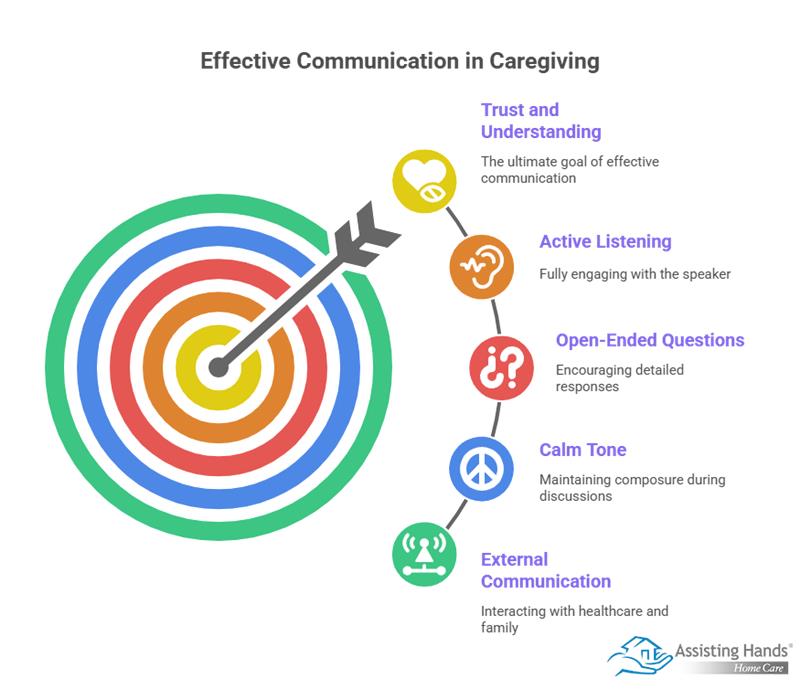
Table of Content
Being a family caregiver is one of the most challenging and rewarding roles one can undertake. Whether you’re caring for an aging parent or a partner with a chronic illness, equipping yourself with the right skills can make a significant difference in providing effective and compassionate care.
Communication and Active Listening
Effective communication is key to building trust and understanding with the person you’re caring for. Caregiving often involves discussing sensitive topics such as medical treatments, feelings, or personal preferences.
- Practice active listening by giving your loved one your full attention, acknowledging his or her concerns, and responding empathetically.
- Use open-ended questions (e.g., “How are you feeling about this?”) to encourage conversation and better understand your loved one’s needs.
- Maintain a calm and patient tone, even during difficult discussions, to foster trust and ease anxiety.
Additionally, clear communication with healthcare providers, other family members, and support services is vital. Keep detailed notes during doctor’s appointments or when discussing care plans to avoid misunderstandings.

Time Management and Organization
Caregivers often manage multiple responsibilities, from scheduling medical appointments to handling household tasks. Mastering time management ensures none of these duties fall through the cracks.
- Create a daily or weekly schedule. Use calendars or digital apps to track appointments, medication times, and even self-care reminders.
- Organize important paperwork, such as medical records, insurance policies, or legal documents, in a safe but accessible location.
Prioritizing tasks helps you focus on what’s most critical and prevents feelings of overwhelm. Delegate tasks when possible to conserve energy for more pressing responsibilities.
A professional caregiver can be a wonderful source of support for both you and your loved one. Senior care experts are available to provide high-quality care to seniors on an as-needed basis. From assistance with mobility and exercise to providing transportation to the doctor’s office and social events, there are a variety of ways professional caregivers can help your aging loved one continue to live independently.
Medical and Emergency Preparedness
While caregivers don’t need to have a medical degree, acquiring basic medical knowledge is crucial when managing another person’s health.
- Learn how to organize medications correctly and recognize potential side effects.
- Familiarize yourself with your loved one’s specific condition or illness so you can address symptoms effectively and spot warning signs of complications.
- Keep an emergency plan ready, including important phone numbers, a list of medications, and step-by-step instructions for common scenarios like falls or allergic reactions.
Consider taking a first aid or CPR certification course to further enhance your preparedness.
Emotional Resilience
Caregiving can be an emotional rollercoaster. Balancing feelings of empathy, stress, and even guilt is often part of the job, making emotional resilience an essential skill for long-term success.
- Practice self-awareness by regularly checking in with your own mental health. Journaling or talking to a trusted friend can help you process difficult feelings.
- Learn techniques for stress management, such as deep breathing exercises, meditation, or physical activities like walking.
- Seek out support groups for caregivers in your local community or online. Sharing experiences and advice with others in similar situations can be incredibly reassuring.
Remember, caring for your own emotional health isn’t selfish. It positions you to provide better care for your loved one.
Family caregivers need to care for their own wellbeing. If you’re caring for an aging loved one and are feeling overwhelmed, consider hiring a professional caregiver to provide respite care. Richmond families who want to prevent burnout can turn to Assisting Hands Home Care. One of our professional caregivers can assist your loved one at home while you take a nap, go to work, run errands, or go on vacation.
Advocacy and Collaboration
Being an advocate is a crucial part of a caregiver’s role. You’ll often serve as the liaison between your loved one and healthcare professionals, ensuring his or her needs and preferences are met.
- Educate yourself about your loved one’s illness or condition so you’re well-informed during medical discussions. Ask clear, specific questions to understand treatment options fully.
- Learn to advocate for your loved one’s rights and choices, whether it’s pushing for better healthcare, working with insurance providers, or ensuring your loved one remains involved in decisions about his or her care.
- Build a strong support network. Collaborate with other family members, friends, or professional caregivers to share responsibilities and insights.
By mastering these skills, you’ll not only provide the best care possible but also enhance your own confidence and effectiveness in tackling the challenges of caregiving.
Not every senior has the same care needs, which means they don’t all need the same type of in-home care. Henrico families can rely on Assisting Hands Home Care to provide individualized care plans to meet their elderly loved ones’ unique care needs. Our caregivers help seniors focus on healthy lifestyle habits such as eating nutritious foods, exercising regularly, and maintaining strong social ties, and we offer mentally stimulating activities that can boost cognitive health and delay the onset of dementia. Trust your loved one’s care to the professionals at Assisting Hands Home Care. Reach out to one of our compassionate Care Managers today.
